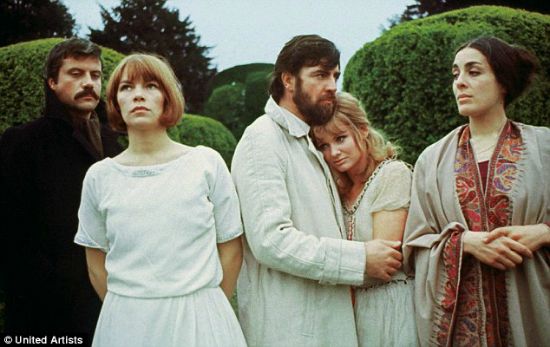 After reading much excellent but verbose nineteenth-century fiction this winter, I am finding D. H. Lawrence’s Women in Love a breath of fresh air.
After reading much excellent but verbose nineteenth-century fiction this winter, I am finding D. H. Lawrence’s Women in Love a breath of fresh air.
I am a huge Lawrence fan. I have always loved this book, and I feel a deep affection for the two heroines, the Brangwen sisters, Ursula, a competent teacher who is both creative and sensual, and Gudrun, an artist who has returned from London and works as an art teacher.
I first read Women in Love after I saw the 1969 movie, directed by Ken Russell, starring Glenda Jackson, Jennie Linden, Alan Bates, and Oliver Reed. Its flamboyance was very much in keeping with the ’60s. (My guess is that I didn’t see it till the ’70s, though, because it was R-rated, and how would we have gotten in?) My best friend and I giggled and called each other Ursula and Gudrun. We both loved and mocked Lawrence!
The publication in 1969 of Kate Millet’s Sexual Politics seemed to excise Lawrence from the canon for women of my generation, but I never minded his maunderings about sex, and read him for his poeticism and philosophical dialogue. I don’t think he is sexist. What would that mean in the context of his work? But I admit, when I was in high school, we did mock the dialogue. Here is how the women talk.
‘Ursula,’ said Gudrun, ‘don’t you really want to get married?’ Ursula laid her embroidery in her lap and looked up. Her face was calm and considerate. ‘
‘I don’t know,’ she replied. ‘It depends how you mean.’
So we used to repeat the dialogue and giggle, as was our wont.
Anyway I was delighted in this rereading by a Turgenev sighting. (I have also read a lot of Turgenev lately.) At a country house party, an Italian woman is sitting on the lawn reading Fathers and Sons, and she finds a very odd phrases in the translation.
“There is a most beautiful thing in my book,” suddenly piped the little Italian woman. ‘It says the man came to the door and threw his eyes down the street.’
There was a general laugh in the company. Miss Bradley went and looked over the shoulder of the Contessa.
‘See!’ said the Contessa.
‘Bazarov came to the door and threw his eyes hurriedly down the street,’ she read.
Again there was a loud laugh, the most startling of which was the Baronet’s, which rattled out like a clatter of falling stones.
‘What is the book?’ asked Alexander, promptly.
‘Fathers and Sons, by Turgenev,’ said the little foreigner, pronouncing every syllable distinctly. She looked at the cover, to verify herself.
‘An old American edition,’ said Birkin.
‘Ha!—of course—translated from the French,’ said Alexander, with a fine declamatory voice.” ‘Bazarov ouvra la porte et jeta les yeux dans la rue.’
He looked brightly round the company.”
‘I wonder what the “hurriedly” was,’ said Ursula.
They all began to guess.
I wonder what American translation that was? I never thought of anybody translating a Russian novel from the French.


Several early translations of Russian literature were via French translations, and Chinese and Arabic books were quite often translated from French or German. Clara Bell’s 1886 War & Peace was from the French and Powys Mathers’ One Thousand Nights and One Night – still the most complete English version – was via Mardrus’ French version. It still happens: Ismail Kadare’s novels are translated from French rather than Albanian – though Kadare himself does the French versions, so perhaps that doesn’t count. Sándor Márai’s best-selling Embers was translated into English from a German translation a few years ago.
LikeLiked by 1 person
WEll, it’s fascinating if very strange. Constance Garnett is the earliest translator I know of the Russians but I have read Clara Bell’s translations of some of the less translated Balzac, and they’re not bad.
I see it is practical to translate from a language you know well, especially if nobody knows the language of the writer. But I’m still haunted by old-school profs who used to tell us, “You can’t do any serious work in translation.” Of course what was serious work? They also told us we must publish in scholarly journals while in graduate school, which showed they had no idea at all of who their students were (most went on to other professions because there were no jobs in classics) and why most people love to read.
LikeLiked by 1 person
I still haven’t got past my mental block about reading Lawrence, despite my Middle Child insisting I bought one of his books last year. I’ll get there eventually….. 🙂
LikeLike
Well, Lawrence is one of my favorites, but not all like him. I recommend Geoff Dyer’s bibliomemoir, Out of Sheer Rage: Wrestling with D. H. Lawrence. It will inspire you!
LikeLiked by 1 person
Yes, I heard too that that happened. But this sounds more like Google translate 😄
LikeLike
It DOES have that sound.
LikeLike